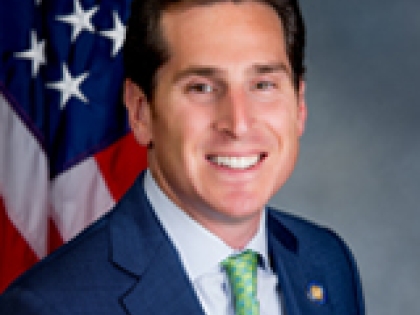
Kaminsky discusses his bill that would make lying to state prosecutors or investigators a felony
New York State Senator Todd Kaminsky has introduced a bill in the new legislative session that would make lying to state prosecutors or investigators a felony. See S. 2371 (2019). In statements to the press, Kaminsky says such a bill is necessary to combat issues of proof in white-collar crime and public corruption cases and would be “a powerful tool for prosecutors.” See S. 2371 (Justification of Bill); see also “Lying to State Prosecutors Could Become Felony in NY Under Proposed Bill,” N.Y.L.J. (Feb. 15, 2019). The proposed law, which Kaminsky likens to the federal statute criminalizing lying in governmental matters, 18 U.S.C. §1001, is limited to white-collar cases, according to Kaminsky, because other offenses, and particularly violent ones, generally are supported by substantial physical evidence. Kaminsky considers the proposed law—which has several Democratic cosponsors from the Senate but none so far from the Assembly—a component of the newly elected Democratic legislators’ criminal justice reform agenda.
Contrary to Kaminsky’s statements, the proposed bill is not needed to advance white-collar or public corruption prosecutions, nor is it limited in application to those cases. Perhaps most importantly, it provides too potent a tool to a state prosecutor and further shifts the already uneven balance of power toward the state. Simply put, the proposed law is a solution in search of a problem, and were it enacted, it would do substantially more harm than good.
The bill’s premise is entirely unfounded: The state already has sufficient tools and techniques for prosecuting white-collar crimes and public corruption. While white-collar cases are not based on the same types of evidence as violent offenses, e.g., video footage, medical evidence, DNA, etc., virtually no white-collar case is based entirely on non-physical evidence, as Kaminsky seems to believe. Rather, white-collar cases are commonly founded on volumes of electronic data, such as emails, trading records, financial transactions, and in some cases, wiretaps. The same goes for public corruption cases, which are often supported by evidence of kickbacks and other quid pro quo deals. This is not to mention the abundant evidence prosecutors and investigators obtain from cooperators. Because white-collar cases frequently turn on issues of knowledge and intent, they are and should be based on careful consideration and presentation of the oftentimes ambiguous contemporaneous evidence. A prosecutor should not be able to circumvent the intricate issues of intent and the burden of proof by deciding to recast the case as a false statement made in a conversation with a prosecutor. Likewise, comparisons to 18 U.S.C. §1001, the federal statute criminalizing false statements to government agencies, are inapt. First, Kaminsky appears to misapprehend the fundamental purpose of §1001. While it does apply to statements made to federal investigators, that is only an offshoot of the statute’s prohibition against false statements to government agencies, e.g., applications submitted to obtain benefits or consideration from those agencies. It was not enacted for the precise purpose of enabling a prosecutor to level a charge against a target.
Application of §1001 also has components, protections and constraints that do not exist in the state system. First, the statute has a critical exception not contained in the proposed state legislation: By its terms §1001 “does not apply to a party to a judicial proceeding, or that party’s counsel, for statements, representations, writings or documents submitted by such party or counsel to a judge or magistrate in that proceeding.” Second, the statute is, on its face, a powerful weapon that would enable a prosecutor to avoid dealing with the complexity of white-collar criminal matters in favor of a simpler charge. As stated by Justice Ruth Bader Ginsburg, it gives prosecutors the “extraordinary authority” to “manufacture crimes.” Brogan v. United States, 522 U.S. 398, 408 (1998) (J. Ginsburg, concurring). Given its potential breadth, however, a body of case law and Department of Justice policies have developed over time that provide some limitation on its use, e.g., a strict interpretation of the requirement of “willfulness.” See Ajoku v. United States, No. 13-7264 (S. Ct. 2014); Russell v. United States, No. 13-7357 (S. Ct. 2014) (briefs of Solicitor General filed March 10, 2014).
From a practical perspective, the federal system provides safeguards against any abuse of §1001. Federal investigators receive substantial training in dealing with false statements made by witnesses and subjects of investigation. For example, FBI agents are required to complete an FD-302 form, commonly known simply as a 302, following any interview. The 302 details the witness’s statements, memorializing them for later use in the investigation or any criminal proceeding. It serves the important function of creating a record of statements made to federal investigators, thus preventing a witness’s statements from being contorted, intentionally or unintentionally, in later proceedings. In contrast, prosecutors across the offices throughout New York state are not subject those kinds of requirements, and prosecutors in New York County generally do not create such records. In fact, proffer sessions in the state system often generate little more than barely legible notes taken by a prosecutor or even a paralegal. Without a safeguard similar to the 302 process, the proposed law creates a real risk that a state prosecutor, in the throes of a hard-fought case, could charge a defendant for lying to them without any physical evidence supporting the claim.
Further, while the bill’s proponents maintain that its scope is limited to material false statements in white-collar or public corruption prosecutions, the bill’s text reveals that it sweeps much more broadly. As currently proposed, the bill would make it a felony to make a material false statement to a state prosecutor or investigator not only in white-collar and public corruption cases, but in any prosecution for grand larceny or criminal possession of stolen property, both of which can be based on forcible takings. Adding another potential crime to an already complete arsenal of charges is both unnecessary and damaging to the criminal justice system.
Also undesirable is the inevitable unintended consequence of the proposed legislation. It would impact most directly the use of proffer sessions in which a target speaks directly to a state prosecutor, either in support of an effort to prevent a case from going forward or because the individual is seeking to cooperate with authorities. For innumerable reasons, those sessions are fraught and, more often than not, the prosecutor believes the target is lying or at least “minimizing” his conduct to some extent. In present practice, those issues can be hammered out and resolved, and a prosecutor can end up with a valuable cooperating witness. But injecting this dangerous element into that process will undoubtedly compel counsel to decline allowing prosecutors to interview their clients.
Kaminsky and other supporters of the proposed bill mistakenly believe that state prosecutors face challenges in successfully prosecuting non-violent or non-drug-related crimes. But New York already has a compendium of laws dealing with these crimes. Contrary to Kaminsky’s supposition, creating a new crime that is easily charged but not easily defended against does nothing to further criminal justice reform. And imbuing prosecutors with expanded power at the same time the legislature is establishing the Commission on Prosecutorial Misconduct seems at least premature. If legislators truly want to reform New York’s criminal justice system, they could enact laws requiring increased discovery and transparency in criminal proceedings.
